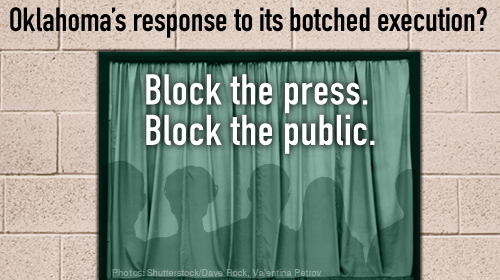Oklahoma's Response to Botched Execution: Hide the Next One from the Public


It's a dark day for Oklahoma. That metaphor is particularly apt this week, as the Sooner State just redoubled its commitment to keeping capital punishment in the shadows by hiding its lethal injection process from public view and oversight.
Five months after Clayton Lockett's horrifically and the state's promise to investigate and improve its execution process, the government responded yesterday with a brand-new "" that only makes it more difficult for the public to know anything about how the government is carrying out the ultimate punishment. No need to read between the lines – the state has listed explicit measures to deepen the mystery surrounding lethal injection and keep the public at bay.
The policy slashes the number of media witnesses allowed to attend an execution from 12 to 5, and it expressly reserves the right to regulate their access on the fly. Even crazier, the policy the state the power to close the execution viewing curtain on a whim, and to remove witnesses – as state officials see fit.
"The government took a process already corrupted by secrecy and made it even more difficult for the public to know anything about it," my colleague Ryan Kiesel at the ACLU of Oklahoma. That's exactly right – and it's a shameful truth that gives the lie to the state's continual references to the ideals of transparency.
We remember how the state responded to Lockett's botched execution on April 29 – with more secrecy. The new execution policy, and its reduction of public oversight, will only increase the likelihood of more cruel and unusual deaths at the hands of the state.
That day, state employees began the execution by repeatedly attempting to insert intravenous lines into Lockett's body. According to the state-commissioned autopsy report, they punctured Lockett in his arms, legs, feet, and neck more than 15 times before settling on a vein in his groin. On its own, that qualifies as barbaric and cruel.
But it got worse.
The physician supervising the process announced that Lockett was unconscious and ready to be injected with the two lethal drugs that would actually kill him. Unfortunately, these drugs cause excruciating pain if the recipient is conscious – and Lockett was. that he began displaying obvious distress: twitching and mumbling. Prison staff reacted by immediately shutting out the press by closing the shade that provided witnesses with a view of Lockett. Twenty minutes later, the execution was "called off," and 10 minutes thereafter Lockett died, his last moments seen by no one except state officials.
It is sad and wrong that in response to evidence that Lockett's lethal injection was cruel and unusual, Oklahoma literally cloaked its execution process in secrecy. Unfortunately, it's now clear that response wasn't an aberration.
Joining with the ACLU of Oklahoma, we filed a lawsuit on behalf of reporter Katie Fretland and two news organizations, and . We argued that under the First Amendment, the state of Oklahoma was prohibited from providing only this form of censored access to executions, showing just the noncontroversial parts. The Constitution, and Oklahomans, deserve better.
In September, the state filed a brief in our case, fiercely defending its right to shroud the death penalty in total secrecy. The state (really) made the following breathtaking statement in its filing with the court: "press or public access to executions does not play any particularly positive role." Wow.
Well, we can think of some good that came out of the Lockett witnesses' presence. For example, how about the fact that the of the execution makes no mention of Lockett's consciousness during the lethal injection procedure? That inconvenient truth emerged only from reporters – who were, fortunately, able to share what they observed before the state scrambled to lock down the botched process. But according to the state, we should just trust that it's telling the truth – and killing people humanely – based solely on its own reports.
The state's brief the , and for a moment it seemed that the state attorney general was backing away from his own office's filing in the case. He told : "Media involvement [in executions] is important for many reasons, not just constitutional, but to make sure the public is fully informed."
But that nod to transparency was short-lived, and it certainly didn't make it into any official documents or legal filings. On the contrary: Yesterday the state, unbelievably, doubled down.
It is shocking that the state would respond to a seriously flawed execution by making future executions less transparent and less accessible. But Oklahoma has made it perfectly clear it would like to exercise its greatest power – ending a human life – without the pesky oversight of the taxpaying public.
Learn more about death penalty and other civil liberty issues: Sign up for breaking news alerts, , and .


